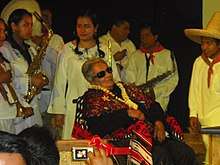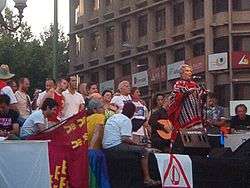Chavela Vargas
Isabel Vargas Lizano (Spanish pronunciation: [tʃaˈβela ˈβaɾɣas]; 17 April 1919 – 5 August 2012), better known as Chavela Vargas, was a Costa Rica-born Mexican singer. She was especially known for her rendition of Mexican rancheras, but she is also recognized for her contribution to other genres of popular Latin American music. She was an influential interpreter in the Americas and Europe, muse to figures such as Pedro Almodóvar, hailed for her haunting performances, and called "la voz áspera de la ternura", the rough voice of tenderness.[1] The Latin Academy of Recording Arts & Sciences, presented her with a Latin Grammy in 2007.
Chavela Vargas | |
|---|---|
 Chavela Vargas in 2009 | |
| Background information | |
| Birth name | Isabel Vargas Lizano |
| Born | 17 April 1919 San Joaquín de Flores, Heredia Province, Costa Rica |
| Died | 5 August 2012 (aged 93) Cuernavaca, Morelos, Mexico |
| Genres | Ranchera |
| Occupation(s) | Singer–songwriter, actress |
| Years active | 1961– 2012 |
| Associated acts | José Alfredo Jiménez |
Early life and career

She was born in Costa Rica, in San Joaquín de Flores, as Isabel Vargas Lizano, daughter of Francisco Vargas and Herminia Lizano. She was baptized on 15 July 1919 with the forenames "María Isabel Anita Carmen de Jesús." She had a difficult childhood: her parents divorced and left her under the care of an uncle, and she contracted poliomyelitis. She went by Chavela, which is a pet name for Isabel. At age 17,[2] she abandoned her native country due to lack of opportunities for a musical career, seeking refuge in Mexico, where an entertainment industry was burgeoning. There she resided for almost eight decades and obtained Mexican nationality.
For many years she sang on the streets, but in her thirties, she became a professional singer.[3] In her youth, she dressed as a man, smoked cigars, drank heavily, carried a gun, and was known for her characteristic red jorongo, which she donned in performances until old. Vargas sang the canción ranchera, which she performed in her own peculiar style. The typical ranchera, as represented by José Alfredo Jiménez, was a masculine but emotional song about love and its mishaps, usually mediated by alcohol, since in a macho culture, the display of feelings by men is allowed only to the drunk. The ranchera is sung from a man's perspective and with a mariachi accompaniment. Chavela sang this type of song as a solo, using only guitar and voice, evoking the singing style of a drunk man. She often slowed down the tempo of melodies to draw more dramatic tension out of songs, so they could be taken as naughtily humorous.
Towards the end of the 1950s, she became known within artistic circles, due in part to her performances in Acapulco, center of international tourism, where she sang at the Champagne Room of the restaurant La Perla. Her first album, Noche de Bohemia (Bohemian Night), was released in 1961 with the professional support of José Alfredo Jiménez, one of the foremost singer/songwriters of Mexican ranchera music.[4] She eventually recorded more than 80 albums.[5] Vargas was hugely successful during the 1950s, the 1960s, and the first half of the 1970s, touring in Mexico, the United States, France, and Spain[6] and was close to many prominent artists and intellectuals of the time, including Juan Rulfo, Agustín Lara, Frida Kahlo, Diego Rivera, Dolores Olmedo and José Alfredo Jiménez.[1]
Partial retirement and return to the stage
Vargas retired from performing due to a 15-year battle with alcoholism, which she described in her autobiography (Y si quieres saber de mi pasado [And if you want to know about my past], published in 2002) as "my 15 years in hell."[7] Chavela couldn't keep on with her heavy drinking and intense lifestyle. In 1970, "submerged in an alcoholic haze" as she described it, she was taken in by a native family who nursed her back to health without knowing who she was. In 2003, she told The New York Times that she had not had a drink in 25 years.[8]
Vargas returned to the stage in 1991, performing at a bohemian nightclub called "El Hábito" in Coyoacán, Mexico City.[1] Her career started to recover international prominence, with performances in Latin America, Europe and the United States.[8] Vargas debuted at Carnegie Hall in 2003 at age 83[9] at the behest and promotion of Spanish director Pedro Almodóvar, an admirer and friend.
Long considered an open secret,[10] she publicly came out as a lesbian at age 81 in her autobiography titled And If You Want to Know about My Past.[11]
But it wasn't really a surprise to her fans. For years Vargas refused to change the genders in her songs.[12] In "Paloma Negra" ("Black Dove"), Vargas accuses a woman of partying all night long and breaking her heart.[12]
Appearances in film
Vargas is featured in many of Almodóvar's films, including La flor de mi secreto in both song and video. She said, however, that acting was not her ambition, although she had previously participated in films such as the 1967 movie La Soldadera.[1] Vargas also appeared in Frida, singing "La Llorona" (The Weeping Woman).[13] Her classic "Paloma Negra" (Black Dove) was also included in the soundtrack of the film. Vargas herself, as a young woman, was alleged to have had an affair with Frida Kahlo during Kahlo's marriage to muralist Diego Rivera.[14][13] She appeared in Alejandro González Iñárritu's Babel, singing "Tú me acostumbraste" ("I got used to you"),[15] a bolero by Frank Domínguez.
On February 10, 2017, the biographical film Chavela debuted. Directed by Catherine Gund and Daresha Kyi, the film features Pedro Almodóvar, Elena Benarroch and Miguel Bosé among others.[16]
References in literature and music
Joaquín Sabina's song "Por el Boulevard de los Sueños Rotos" ("Down Broken Dreams Boulevard") is dedicated to Vargas.[1] Sergio Ramírez Mercado, a Nicaraguan writer, published in 2011 the novel La Fugitiva, a fictionalized account of the life of Costa Rican writer Yolanda Oreamuno. In Ramírez' work, Oreamuno's life is told by three women who met her. According to many critics, one of the female characters telling Oreamuno's history is a singer who resembles Chavela Vargas. The character talks about her own life and her non-reciprocated lesbian love for Yolanda Oreamuno.[17]
Death and legacy
Chavela Vargas had been hospitalized for several weeks as a result of respiratory problems. She died in Cuernavaca, Mexico. According her official Facebook page, her last words were "I leave with Mexico in my heart."
On April 17, 2013, Google celebrated her 94th birthday with a Google Doodle.[18]
In August 2019, Vargas was one of the honorees inducted in the Rainbow Honor Walk, a walk of fame in San Francisco’s Castro neighborhood noting LGBTQ people who have "made significant contributions in their fields."[19][20][21]
Selected discography
- Con el cuarteto Lara Foster, 1961
- Hacia la vida, 1966
- Corridos de la revolución, 1970
- Amanecí en tus brazos, 1973
- La Original, 1973
- Lamento Borincano, 1973
- Poema 20, 1975
- Noche Bohemia, 1989
- Noche de Ronda, 1989
- Piensa en mí AKA Vuelve, 1991
- Boleros, 1991
- La Llorona, 1993
- Sentimiento de México (vol. 1), 1995
- De México y del Mundo, 1995
- Le canta a México, 1995
- Volver, volver, 1996
- Dos, 1996
- Grandes mementos, 1996
- Macorina, 1994/1996
- Chavela Vargas, 1997
- Pasión bolero, 1999
- Colección de oro, 1999
- Con la rondalla del amor de Saltillo, 2000
- Para perder la cabeza, 2000
- Las 15 grandes de Chavela Vargas, 2000
- Grandes éxitos, 2002
- Para toda la vida, 2002
- Discografía básica, 2002
- Antología, 2004
- Somos, 2004
- En Carnegie Hall, 2004
- La Llorona, 2004
- Cupaima, 2006/2007
- Soledad, 2007
- Piensa en mí, on Splendor in the Grass by Pink Martini, 2009
- Luz de Luna, on San Patricio by The Chieftains featuring Ry Cooder, 2010
- Por mi culpa!, 2010
- Luna Grande, 2012
See also
- Ranchera
- Cuco Sanchez
- List of people from Morelos, Mexico
References
- Boccanera, Jorge, Entrelineas: Dialogos con Jorge Boccanera, ed. Mario José Grabivker (Buenos Aires: Ediciones instituto movilizador fondos cooperativos C.L., 1999)
- Vargas, Chavela, Y si quieres saber de mi pasado, ed. J.C. Vales, 2nd ed (Madrid: Santillana Ediciones Generales, 2002). In the interview with Jorge Boccanera, Vargas is quoted as saying she arrived in Mexico at 17.
- Garrido, Isaac (5 August 2012). "Chavela Vargas Dead At Age 93, Famed Mexican Singer Challenged Catholic And Chauvinist Preconceptions". The Huffington Post. Retrieved 5 August 2012.
- Diccionario de la Música Española e Hispanoamericana. 5 vols. Madrid: Sociedad General de Autores y Editores, 2002. s.v. "Vargas, Chavela".
- Yarbro-Bejarano, Yvonne. "Crossing the Border with Chabela Vargas: A Chicana Femme's Tribute" [sic] Chap. 3, Sex and Sexuality in Latin America (New York: New York University Press, 1997)
- Diccionario de la Música Española e Hispanoamericano. 5 vols. Madrid: Sociedad General de Autores y Editores, 2002.
- Vargas, Chavela, Y si qui pasado, ed. J.C. Vales, 2nd ed (Madrid: Santillana Ediciones Generales, 2002), p. 189
- Obituary in the New York Times, 7 August 2012
- Vargas, Chavela. (2006) Chavela at Carnegie Hall, CD recording, Tommy Boy
- Gund, Catherine & Kyi, Daresha (Directors) (2017). Chavela (Documentary film). Syldavia Cinema.
- Siadate, Nazly (August 20, 2012). "Chavela Vargas and Frida Kahlo an Item in '60s-era Mexico?". Pride. Retrieved September 24, 2019.
- Garsd, Jasmine (August 5, 2012). "Chavela Vargas: A Legend Of Latin American Song". NPR. Retrieved September 24, 2019.
- Vargas, Chavela, Y si quieres saber de mi pasado, ed. J.C. Vales, 2nd ed (Madrid: Santillana Ediciones Generales, 2002)
- Sofía Ruiz-Alfaro PhD (2012) From Chavela to Frida: Loving from the Margins, Journal of Homosexuality, 59:8, 1131-1144, DOI: 10.1080/00918369.2012.712818
- Tu Me Acostumbraste - Chavela Vargas on Odeo
- Chavela on IMDB
- "Sergio Ramírez: política y ficción" (in Spanish). Sigueleyendo. April 8, 2011. Archived from the original on April 11, 2011.
- "Chavela Vargas' 94th Birthday". Google. 17 April 2013.
- Barmann, Jay (September 2, 2014). "Castro's Rainbow Honor Walk Dedicated Today". SFist. SFist. Archived from the original on August 10, 2019. Retrieved August 15, 2019.
- Bajko, Matthew S. (June 5, 2019). "Castro to see more LGBT honor plaques". The Bay Area Reporter. Retrieved 2019-08-16.
- Yollin, Patricia (August 6, 2019). "Tributes in Bronze: 8 More LGBT Heroes Join S.F.'s Rainbow Honor Walk". KQED: The California Report. Retrieved 2019-08-16.